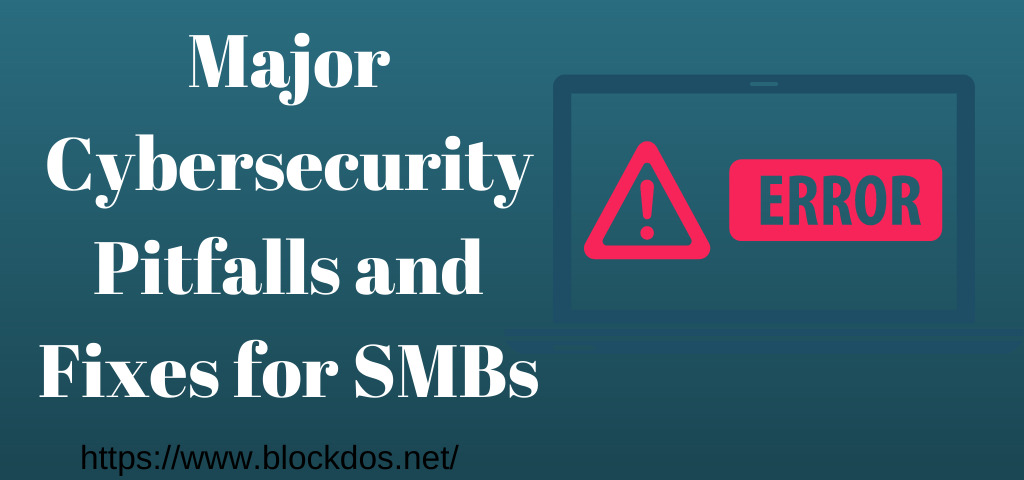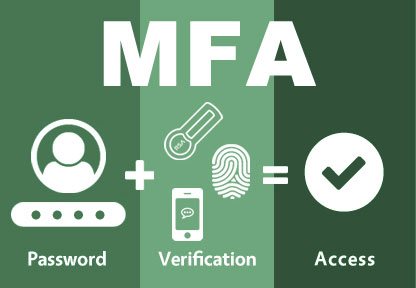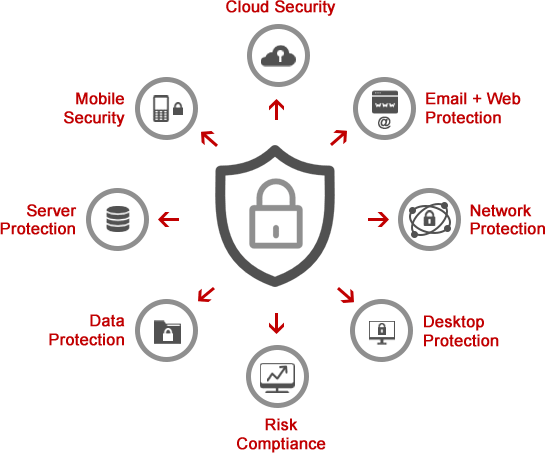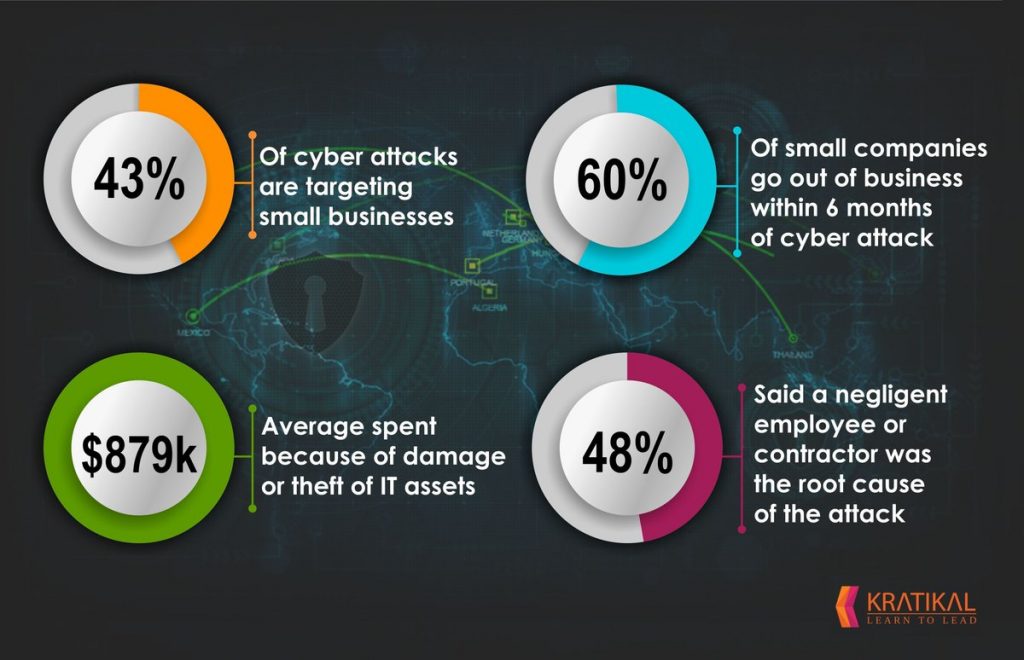Major Cybersecurity Pitfalls and Fixes for SMBs

As of 2021, amidst the COVID-19 pandemic, businesses have started to grow more and more dependent on the Internet. Hence, trolls and hackers have started to use increasingly sophisticated tools to target them. The following are examples of methods used for hacking into a company’s software
- Computer viruses: computer viruses can swiftly replicate throughout your system and do substantial damage by modifying or deleting essential files.
- Computer worms: just like viruses, worms can spread into your entire network. This means each and every computer becomes infected almost instantly, having essential data either deleted or modified.
- Spyware: spyware silently observes you and your employees and transmits information to cybercriminals. A leak of such sensitive information can escalate to blackmail or even espionage
- Keyloggers: are a sneaky type of spyware that log your keystrokes and send them to hackers to help them commit financial fraud.
- Ransomware: as the name suggests, Ransomware, a very dangerous form of malware, locks all of your critical data or even your entire system until a ransom is paid to the criminals. This will mostly be in the form of cryptocurrency as it is nearly impossible to trace.
Almost all of these types of malware can be embedded into your system through phishing methods or Trojan horses. Phishing is carried out in the form of an authentic-looking email to the company which contains malware. Trojan horses are malware disguised as authentic software.
To protect yourself from facing such mishaps, you need antivirus software but with an ocean of options to choose from, you need to be smart and make the right choice. Not every solution will be to your needs
Small-to medium-sized businesses or SMBs are especially vulnerable to being hacked as they lack the resources to put up as strong a fight as huge conglomerates will. There are several mistakes made by SMBs which makes them easy targets.I’m going to discuss some of the cybersecurity pitfalls faced by SMBs and their fixes below:
1. Absence of Multi-factor authentication
Most SMBs only rely on traditional logins for employees to gain access to their systems. As opposed to the traditional login system which only requires a login and password, Multi-factor authentication (MFA) requires the users to provide an additional identifier to legitimize their identity. The secondary identifier is unique for every person. It can be a biometric scan (fingerprint, facial recognition), SMS- based or even a digital code on a USB. All of these methods come with their own advantages and disadvantages but overall, MFA is very effective in protecting against hacking.

Nowadays most of the digital platforms including Facebook, Google, and Twitter offer MFA logins. As a rule, for safety more and more SMBs should adopt MFA- based logins.
2. No penetration testing
Penetration testing is a good way to find out any flaws in your security so they can be fixed. Unfortunately, not all SMBs do this as penetration testing takes a lot of time. This means that it is almost impossible to carry the process out without having a cybersecurity professional at the firm.
For SMBs it is recommended that they hire a trusted outside firm to run tests for them. Choose a firm that explains their methods properly and form a plan to fix any issues they find
3. Thinking they are not possible targets
It is often assumed that hackers are after the larger firms as the payoff will be huge. In hindsight, it looks plausible as a person will only invest their time into something that will yield high rewards for their risks. In terms of cybersecurity, this will not always be the case.
Large corporations will invest a lot in their IT security and have a large number of security experts working for them. Furthermore, they can afford to purchase state-of-the-art security systems which further safeguards their interests. This makes them a very difficult target to hack. This causes a shift in hackers towards SMBs where they don’t find so much resistance and although the rewards may be lesser, so is the effort and time spent.
SMBs today handle significant amounts of sensitive data and should therefore see themselves as potential targets. This will encourage them to take appropriate steps towards securing their network.
4. Lack of Endpoint security
Endpoint security means securing end or entry points of end-user devices like mobile phones and laptops from being hacked by malicious parties. These points can be protected by Endpoint security systems on a network or even in the cloud.
Organizations ranging from small start-ups to large enterprises are all equally at risk from cybercriminals and hackers. Hence, endpoint security is vital for safety and is often the first place to be secured by an organization.

BullGuard’s survey of more than 3000 SMBs shows us that around 23% of all the small businesses in both the UK and USA are negligent in using endpoint security. Furthermore, 32% of the ones using endpoint security opt for free or consumer-grade cybersecurity solutions. This negligence can be the difference between the thriving and the death of a business.
5. Employee negligence
According to research, the number one cause of data breaches in small businesses across America still remains employee negligence. Small missteps like connecting to public networks or hotspots can cause severe damage to small businesses. These slip-ups become the victims of man-in-the-middle attacks. Another mistake that can be made by employees is their password management. Be it sharing their passwords with others or devising easy to predict passwords, employees can often unintentionally damage businesses beyond repair.

Cybersecurity handles managing risk wherever possible, for small businesses that also means controlling internal behaviors. To live up to the level of resilience to cope with threats present today, SMBs should focus on practicing security fundamentals with their workforce alongside outsourcing their cybersecurity to third-party experts.
6. DDoS attacks
Distributed Denial of Service (DDoS) attacks happen in the form of an ambush of large amounts of web traffic. This slows the company’s website drastically and forces crucial services to go offline in most cases.
SMBs relying on websites and other online services are very susceptible to DDoS as an attack can prove to be catastrophic. Hence, such businesses should ensure the availability of extra bandwidth, create a DDoS response plan if an attack occurs, and use a DDoS mitigation providers like Blockdos to safeguard themselves from any threats.
7. Free software and cloud-based applications
During the start-up phase, businesses tend to rely on free software and cloud-based services to keep their expenditure in check. Using services like Gmail, Outlook, or Yahoo mail may be acceptable in a start-up’s early days but, these do not provide adequate security for your most confidential data. So much so that in some cases, they may not even be in compliance with relevant data protection laws like HIPAA or GDPR. What’s even worse is that Gmail and Yahoo mail have billions of accounts. If you run into trouble that you can not fix yourself, you may not be provided the adequate and timely response that u need.
In order to protect yourself from such mishaps, it is recommended for SMBs to develop their applications and network through PAAS pr host their applications and data on SAAS. PAAS or Platform as a service is a type of cloud computing in which the business will be provided with a platform by the provider. Hence, you can develop, run and manage business applications without having to build or maintain any infrastructure for such software development. SAAS or Software as a service is the type of cloud computing where data is hosted, maintained, and updated by a third-party provider.
Although SAAS is easier as it takes off the responsibility of updates and maintenance, PAAS is more secure as instead of the third party, you are in control of your data and applications.
8. Being proactive
It is crucial for a company to be proactive when managing its cybersecurity. Proactivity can be the difference between protection from worst-case scenarios and becoming a victim to them.
According to Forbes, 28% of small- to medium-sized businesses experienced data breaches in 2019. While some of the companies managed to recover after months, others failed to do so entirely and had to close down permanently. Small businesses should take these attacks seriously as, due to the global pandemic, their workforce is operating remotely away from the safety of their network and computers. This has made it fairly easier for hackers to tap into a company’s network and steal their data.
It goes without saying that every SMB should invest time and money in cybersecurity software. The right software for your company is the one that will secure and empower every member of your team, offer dedicated support, be lightweight and work on various platforms but most of all, it should be cost-effective.
